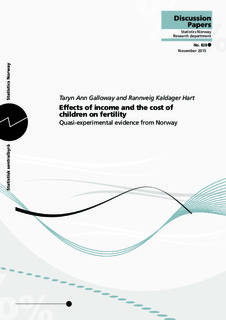Effects of income and the cost of children on fertility. Quasi-experimental evidence from Norway
Working paper
Permanent lenke
http://hdl.handle.net/11250/2570030Utgivelsesdato
2015-11-30Metadata
Vis full innførselSamlinger
- Discussion Papers [1002]
Sammendrag
The relationship between income, cost of childrearing and fertility is of considerable political and theoretical interest. We utilize exogenous variation in family income and the direct cost of children to estimate causal effects on fertility.
The relationship between income, cost of childrearing and fertility is of considerable political and theoretical interest. We utilize exogenous variation in family income and the direct cost of children to estimate causal effects on fertility. The variation comes from a regional child benefit and tax reform implemented in the northern municipalities of the Norwegian county Troms. The southern municipalities of the same county constitute a plausible and empirically similar control group. Individual-level multivariate analysis suggests that a reduced direct cost of children increases fertility, mainly among unmarried women in their early 20s. We find little evidence of income effects on fertility. Our results are robust to a variety of specifications, including a standard difference-in-difference setup, and regional trend modeling. The findings indicate that lowering the direct cost of a child would shift childbearing to lower ages in Norway. However, a lower price of children is also likely to induce a shift towards non-union childbearing or childbearing in less stable unions.
